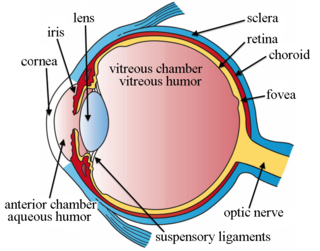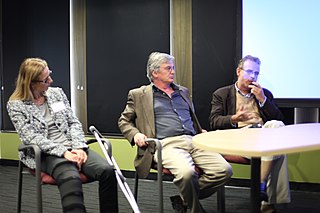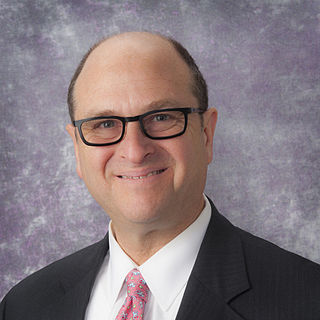
Macular degeneration,also known as age-related macular degeneration,is a medical condition which may result in blurred or no vision in the center of the visual field. Early on there are often no symptoms. Over time,however,some people experience a gradual worsening of vision that may affect one or both eyes. While it does not result in complete blindness,loss of central vision can make it hard to recognize faces,drive,read,or perform other activities of daily life. Visual hallucinations may also occur.
Bevacizumab,sold under the brand name Avastin among others,is a monoclonal antibody medication used to treat a number of types of cancers and a specific eye disease. For cancer,it is given by slow injection into a vein (intravenous) and used for colon cancer,lung cancer,ovarian cancer,glioblastoma,and renal-cell carcinoma. In many of these diseases it is used as a first-line therapy. For age-related macular degeneration it is given by injection into the eye (intravitreal).
The Keck School of Medicine of the University of Southern California teaches and trains physicians,biomedical scientists and other healthcare professionals,conducts medical research,and treats patients. Founded in 1885,it is the second oldest medical school in California after the UCSF School of Medicine.
An angiogenesis inhibitor is a substance that inhibits the growth of new blood vessels (angiogenesis). Some angiogenesis inhibitors are endogenous and a normal part of the body's control and others are obtained exogenously through pharmaceutical drugs or diet.
Ranibizumab,sold under the brand name Lucentis among others,is a monoclonal antibody fragment (Fab) created from the same parent mouse antibody as bevacizumab. It is an anti-angiogenic that is approved to treat the "wet" type of age-related macular degeneration,diabetic retinopathy,and macular edema due to branch retinal vein occlusion or central retinal vein occlusion.

Choroidal neovascularization (CNV) is the creation of new blood vessels in the choroid layer of the eye. Choroidal neovascularization is a common cause of neovascular degenerative maculopathy commonly exacerbated by extreme myopia,malignant myopic degeneration,or age-related developments.

Napoleone Ferrara is an Italian-American molecular biologist who joined University of California,San Diego Moores Cancer Center in 2013 after a career in Northern California at the biotechnology giant Genentech,where he pioneered the development of new treatments for angiogenic diseases such as cancer,age-related macular degeneration (AMD),and diabetic retinopathy. At Genentech,he discovered VEGF—and made the first anti-VEGF antibody—which suppresses growth of a variety of tumors. These findings helped lead to development of the first clinically available angiogenesis inhibitor,bevacizumab (Avastin),which prevents the growth of new blood vessels into a solid tumor and which has become part of standard treatment for a variety of cancers. Ferrara's work led also to the development of ranibizumab (Lucentis),a drug that is highly effective at preventing vision loss in intraocular neovascular disorders.
Paul Pringle is an American investigative journalist for the Los Angeles Times and author of the 2022 book Bad City:Peril and Power in the City of Angels.
Bascom Palmer Eye Institute is the University of Miami School of Medicine's ophthalmic care,research,and education center. The institute is based in the Health District of Miami,Florida,and has been ranked consistently as the best eye hospital and vision research center in the nation.

Joel S. Schuman,MD,FACS is Professor of Ophthalmology,the Kenneth L. Roper Endowed Chair,Vice Chair for Research Innovation,co-director of the Glaucoma Service at Wills Eye Hospital,Professor of Biomedical Engineering at Drexel University School of Biomedical Engineering,Science and Health Systems,Collaborative Community of Ophthalmic Imaging (CCOI) president,and American Glaucoma Society (AGS) Foundation advisory board chair. Prior to this he was the Elaine Langone Professor and Vice Chair for Research in the Department of Ophthalmology at NYU Langone Medical Center,NYU Grossman School of Medicine;Professor of Biomedical Engineering and Electrical &Computer Engineering at NYU Tandon School of Engineering and Professor of Neural Science in the Center for Neural Science at NYU College of Arts and Sciences. He chaired the ophthalmology department at NYU Langone Health,NYU Grossman School of Medicine 2016–2020,and was Vice Chair for Ophthalmology Research in the department 2020–2022. Prior to arriving at NYU in 2016,he was Distinguished Professor and Chairman of Ophthalmology,Eye and Ear Foundation Endowed Chair in Ophthalmology,Director of UPMC Eye Center (2003-2016) and before that was at Tufts University 1991–2003,where he was Residency Director (1991-1999) and Glaucoma and Cataract Service Chief (1991-2003). In 1998 he became Professor of Ophthalmology,and Vice Chair in 2001.
The USC Gayle and Edward Roski Eye Institute,part of Keck School of Medicine of USC,is a center for ophthalmic care,research and education located in downtown Los Angeles,California. It has subsidiary clinics in Pasadena,Beverly Hills and Arcadia. It was allied with the Doheny Eye Institute from 1975 until 2013,when Doheny allied with University of California Los Angeles.
Rohit Varma is an Indian-American ophthalmologist and professor of ophthalmology and preventive medicine. In 2014,he was named director of the USC Eye Institute and chairman of the Department of Ophthalmology for Keck School of Medicine of USC. In March 2016,Varma was named the interim dean of the Keck School of Medicine,and in November was named dean. In October 2017,USC announced that he stepped down as dean. In October 2018,Varma became the founding director of the Southern California Eyecare and Vision Research Institute.
Joan Whitten Miller is a Canadian-American ophthalmologist and scientist who has made notable contributions to the treatment and understanding of eye disorders. She is credited for developing photodynamic therapy (PDT) with verteporfin (Visudyne),the first pharmacologic therapy for retinal disease. She also co-discovered the role of vascular endothelial growth factor (VEGF) in eye disease and demonstrated the therapeutic potential of VEGF inhibitors,forming the scientific basis of anti-VEGF therapy for age-related macular degeneration (AMD),diabetic retinopathy,and related conditions.
Anti–vascular endothelial growth factor therapy,also known as anti-VEGF therapy or medication,is the use of medications that block vascular endothelial growth factor. This is done in the treatment of certain cancers and in age-related macular degeneration. They can involve monoclonal antibodies such as bevacizumab,antibody derivatives such as ranibizumab (Lucentis),or orally-available small molecules that inhibit the tyrosine kinases stimulated by VEGF:sunitinib,sorafenib,axitinib,and pazopanib.
James G. Fujimoto is Elihu Thomson Professor of Electrical Engineering and Computer Science at the Massachusetts Institute of Technology (MIT) and a visiting professor of ophthalmology at Tufts University School of Medicine,Boston,Massachusetts.

Faricimab,sold under the brand name Vabysmo,is a monoclonal antibody used for the treatment of neovascular age-related macular degeneration (nAMD) and diabetic macular edema (DME). Faricimab is the first bispecific monoclonal antibody to target both vascular endothelial growth factor (VEGF) and angiopoietin 2 (Ang-2). By targeting these pathways,faricimab stabilizes blood vessels in the retina. It is given by intravitreal injection by an ophthalmologist.

Paul A. Sieving is a former director of the National Eye Institute,part of the U.S. National Institutes of Health. Prior to joining the NIH in 2001,he served on the faculty of the University of Michigan Medical School as the Paul R. Lichter Professor of Ophthalmic Genetics. He also was the founding director of the Center for Retinal and Macular Degeneration in the university's Department of Ophthalmology and Visual Sciences.

Stem cell therapy for macular degeneration is the use of stem cells to heal,replace dead or damaged cells of the macula in the retina. Stem cell based therapies using bone marrow stem cells as well as retinal pigment epithelial transplantation are being studied. A number of trials have occurred in humans with encouraging results.

Bad City:Peril and Power in the City of Angels is a nonfiction book written by Paul Pringle. It is based on investigative reporting by a team of Los Angeles Times reporters,which included Pringle,as they cover University of Southern California and Los Angeles Times cover-ups and scandals. The book was released by Celadon Books on July 19,2022.
Richard Frederick Spaide is an American ophthalmologist and retinal specialist known for his contributions to the field of retinal diseases and surgical procedures.








